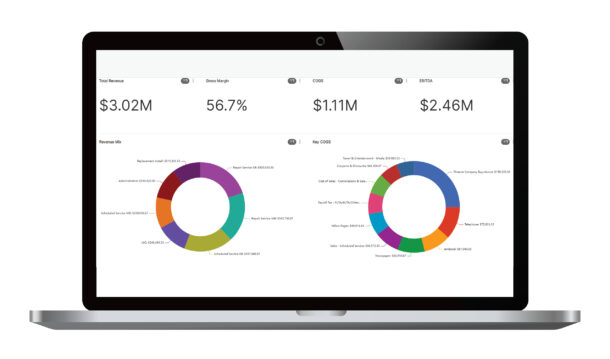The reality is it can be daunting to choose business management software. There are numerous options available in the marketplace today and many facets to consider. Having the ability to effectively dispatch your teams in the field, streamline your accounting data flow and access your business metrics at the touch of a button are all valuable features you may want to set your team up for success. It can take time to properly evaluate the needs of your business and feel confident that you are making the best selection, but starting with these three areas will help you begin narrowing down your choices:
Features: Sure, there are many tasks you are probably looking to manage in the daily operations of your team, but which ones are the most important to your business? Consider separating your list into features that are an absolute must and those you would enjoy but could run your business successfully without. If one platform checks more of those “must have” boxes, then you will have identified a leading candidate.
Processes: Think through the current process you use for job management and make note of the positives and negatives that come to mind. What is working well, and what could use a new approach? Sometimes writing down the steps in your current process can help you visualize how it could be improved in a new system. For instance, some software systems may have more automation than you currently do, making it easier to get the job done.
Stakeholders: Anyone on your team who will be using the platform should have a say in this evaluation process. They know what is needed to make things run smoothly. You will want to include all relevant team members in brainstorming exercises and any meetings you have with vendors to demo the product. Don’t forget your IT team so they can ask any hosting, data conversion, or implementation questions.
Now that you’ve taken some initial steps to evaluate the features you need and want, the processes you’re trying to improve and the feedback of your team members, it’s time to ask some more in-depth questions to make sure you’re finding the right business management software for you. Here are the top questions to consider:

What features does the software have?
You already thought through your must-have and nice-to-have features, so go back to that list and see how many boxes you can check off. If you have already identified that you absolutely must have a user-friendly dispatch board, a top-notch accounting module or a management system to keep your agreements and maintenance visits flowing, then you know those are non-negotiable features.
Don’t forget the ones on your nice-to-have wish list either. Once you weigh all your options, you may decide having key performance indicators and business metrics available at the touch of a button is a feature you really do want to add to your toolkit.
Another important thing to consider when evaluating features is how many are built directly in the software and what would you have to purchase separately – whether that be from another vendor that could potentially integrate with the software or add-on features from the software you choose.
Even if you know you won’t use all the features right away, it may be worth it to go with a field service management software that has numerous options built into the software, so you have those options down the line.
Is there accounting built in?
Do you want your service data to be connected to your financial information without the need to sync data or enter it into two different platforms? Or do you have an existing accounting software system that you want to make sure will integrate with your new platform? Whichever camp you are in, accounting is an important area you want to consider.
Think of it this way – you have two options. You can go with a standard accounting software and then purchase dispatch tools that sit on top of that software, or you can look for an all-in-one platform that has accounting built-in, eliminating the need for an additional payment to an additional software company.
Does it integrate with any other vendors?
Speaking of integrating…you may be using other existing vendors for things like your pricebook, online reputation management and document storage. Finding a software system that makes integration seamless with these other vendors will help you continue with business as usual.
Is the Customer Service team responsive?
You are guaranteed to have questions during migration and as you get deeper into the software. Many of these will be pressing questions that can be the difference between increased or lost revenue. There’s a lot on the line for your business, so whatever system you go with, make sure the provider has a responsive customer service team that will get back to you promptly.
Is the software hosted on a physical server, or is it hosted in the cloud?
The safety of your data is a top priority. The cloud typically offers more security benefits – data backup, disaster recovery, increased performance and more – than traditional hosting on a server.
You should also ask yourself if the ability to work from anywhere is important to you. If you answered yes, then a cloud-hosted software system is the way to go. With traditional servers, you can only access your files from the location of the physical server.
How easy is it to migrate my current data over to the new platform?
Data migration can be a nerve-wracking time for a business owner, but moving into a new platform should be easy and secure. Make sure your new provider is available to walk you through every step of the process, ensuring all your important data is captured as it is being imported into the new software.
How easy is the system to learn and use?
The ease-of-use to a new software platform can make or break your transition. Ideally, you want the system to be user-friendly and intuitive for your office staff and techs to pick up and learn. If they need significant training or have more questions than answers, you will need to factor in whether or not there are resources provided to give extra help adapting to the new software. Extra help from the software provider might look like a dedicated Customer Success Manager or online training courses available on demand.
What is the cost?
Last, but certainly not least, cost is a significant factor when considering a new business management software. No one wants to break the bank, so look for something that can grow and scale with your business at a reasonable price.
Don’t let the magnitude of your business management software decision keep you from pushing forward to a better way. Yes, it will take some time and consideration to find the right fit that will have your business humming along at its most streamlined and efficient, but working through these steps and questions will help you move beyond analysis paralysis and into success.
 Chris O’Grady has been in sales for 30 years, focusing on software sales for the last 20. Chris has been leading and growing sales teams for most of his career, with his most recent positions at FinancialForce and CBORD, where he led high-performing sales teams and was able to help drive tremendous growth for each company. In April 2022, Chris joined Successware as the Chief Sales Officer. He brought with him a proven history of business growth and increased sales performance. In his current role, Chris leads sales, sales operations, and customer success and is responsible for driving sales strategy.
Chris O’Grady has been in sales for 30 years, focusing on software sales for the last 20. Chris has been leading and growing sales teams for most of his career, with his most recent positions at FinancialForce and CBORD, where he led high-performing sales teams and was able to help drive tremendous growth for each company. In April 2022, Chris joined Successware as the Chief Sales Officer. He brought with him a proven history of business growth and increased sales performance. In his current role, Chris leads sales, sales operations, and customer success and is responsible for driving sales strategy.




Join the conversation: